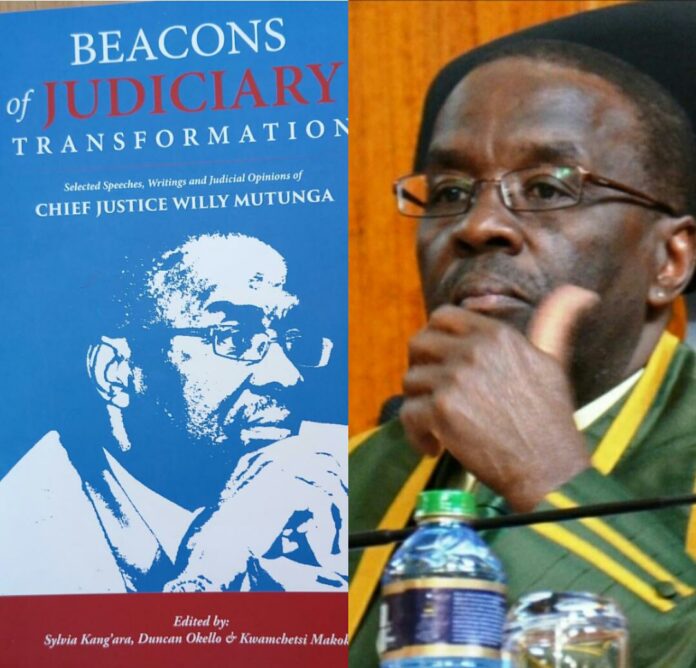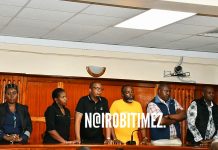BY SAM ALFAN.
Former Chief Justice Dr Willy Mutunga has revealed that he inherited a Judiciary that was designed to fail, when he was appointed the first Chief Justice under the 2010 constitution.
In a tell-it-all book, Dr Mutunga reveals that the Chief Justice office operated like a judicial monarch supported by the Registrar of the High Court, with power and authority that was highly centralized. Accountability mechanisms were weak and reporting requirements absent, he said.
“We are glad that the new constitution has radically altered this ugly structure. We now have a decentralized Judiciary with Supreme Court and court of appeal having their own presidents and High Court having principal judge at their respective helms,” Dr Mutunga says in the book launched recently.
The former CJ warned that Kenyans must not take the dispersal of power for granted, “For the intoxicating nature of power can be true of the judiciary as it is of the Executive”.
In the book titled BEACONS of JUDICIARY TRANSFORMATION, for retired CJ reveals that he found an institution so frail in its structures, so thin on resources, so low in its confidence, so deficient in integrity, so weak in its public support that to have expected it to deliver justice was to be wildly optimistic.
He said in order to strengthen the collective and accountability, use of power envisaged in the constitutional architecture, he took additional administrative decisions to give effect to the intentions of the Constitution and set up a leadership committee that acted as the management team for the entire Judiciary.
The former CJ said the composition included Chief Justice as the chair, the Deputy Chief Justice, the president of the court of Appeal, the Principal Judge of the High Court, as well as representatives from the magistracy and the paralegal fraternity. He said this permitted all the voices of the Judiciary to be heard in the management of this important institution.
He revealed that the new team at the helm of the judiciary brought with it the necessary political will to implement reforms that many had long identified.
“Some of them included excessive bureaucracy and a silo mentality among organisational units and the court system, backlog of cases, endemic corruption, inefficient and ineffective case flow management, poor terms and conditions of service for judicial and administrative staff among others.
Dr Mutunga reveals that he had listened to the voice of Kenyans keenly, unceasing and unequivocal in its invocation to the judiciary cleanup. This call was driven by recognition that that the transformation of the Judiciary constituted the next most important stage in our democratic transition a recognition that a Judiciary that upholds the rule of law, dispenses justice fairy and efficiently.
“The ends of Justice cannot be met when the judiciary not only suffers and integrity deficit but is also perceived as a playground of the corrupt and refuge of the inept. Corruption corrodes our humanity, undermines our institutions and sabotages our economy,” the former CJ said in his book.
Mutunga said never again should it be possible to speak about corruption and the Judiciary in the same breath and he meant it and appointed an ombudsman to receive and respond to complaints by staff and the public. He reveals that in just three months, the office had received over 700 complaints of various categories.
Among other reforms is the approval for the creation of additional posts in the magistracy and Kadhis establishment, and which immediately promoted 278 Magistrates and 12 Kadhis.
He reveals that at the High Court alone, they found 2,015 pending criminal appeal cases. Some have not been heard for as long as 20 years because their files were missing or the records were incomplete.
“It was a mockery of the off-quoted legal adage that Justice delayed is Justice denied, and we had taken decisive steps to right the situation. Civil cases in the court hold up a great amount of resources needed for economic growth. Clearing the backlog was not only serve the ends of justice but also free resources into the economy and deepen investor confidence,” Dr Mutunga said.
Dr Mutunga made a Judiciary policy that once proceedings begin, cases will be heard back-to-back on a first filed, first heard basis and queuing of the cases will take away the incentive for corruption.







